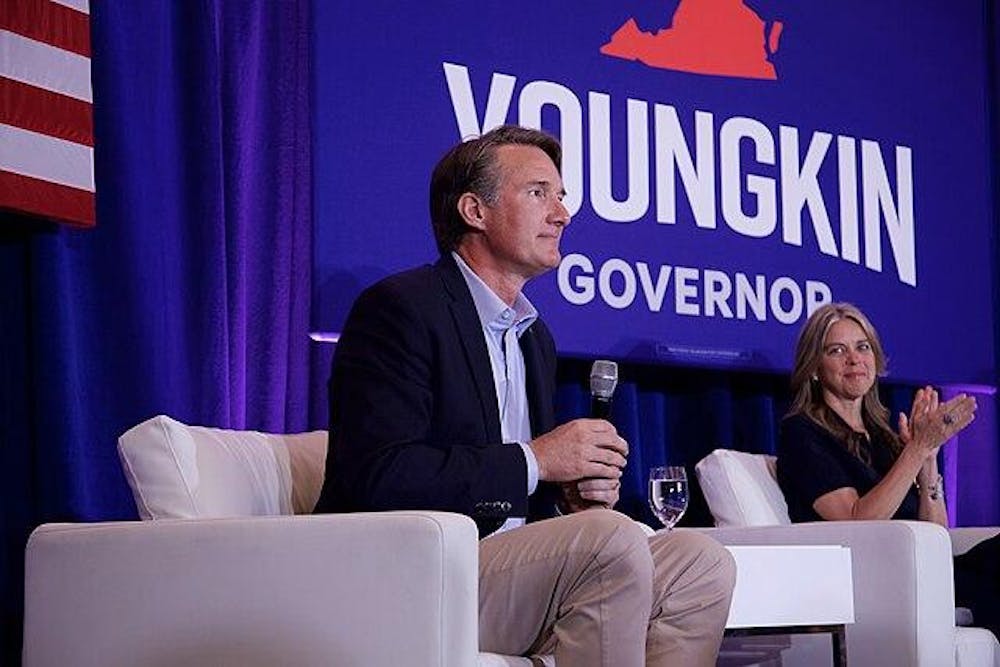Gov. Glenn Youngkin issued a sharply worded, three-page letter Thursday responding to Gov.-elect Abigail Spanberger’s call for the Board of Visitors to pause the ongoing presidential search. Spanberger issued the statement Wednesday, in which she urged the Board to delay the appointment until after she takes office in January.
“It’s regretful that I must communicate to you in this manner, but your correspondence left me no other choice,” Youngkin wrote.
The outgoing governor claimed that Spanberger’s letter was “riddled with hyperbole and factual errors” and that she had reached conclusions before she or her team learned all the facts.
Youngkin also wrote that Spanberger’s outreach to the Board was unprecedented for an incoming governor in Virginia.
“I am advised that this was likely the first time in the history of our Commonwealth that a Governor-elect attempted to interfere with the governance of a university and the fiduciary duties of individual board members,” Youngkin wrote.
Spanberger’s statement argued that ongoing vacancies and failed confirmations have “severely undermined” the legitimacy of the Board’s governance and jeopardized the credibility of the search for the University’s next president. She cited multiple votes of no confidence from the Faculty Senate and Student Council, as well as the General Assembly’s failure to confirm five Youngkin-appointed members. In Spanberger’s letter, she connected the presidential search to uncertainty following former President Jim Ryan’s departure.
“In the wake of the departure of President Jim Ryan as a result of federal overreach — unchallenged by the Board — the University now faces the serious task of selecting its tenth president,” Spanberger wrote.
Responding directly to Spanberger’s characterization of Ryan’s departure, Youngkin rejected the claim that it resulted from federal overreach, calling it a “mistaken belief.”
“I have been thoroughly briefed and it’s clear that neither [the] DOJ nor the current Board leadership made Jim resign,” Youngkin wrote. “His resignation took place under the leadership of Rector Robert Hardie, who was appointed by Governors Kaine, McAuliffe and Northam, and his resignation was encouraged personally by former Rector Rusty Conner, who was the rector during Jim’s hiring.”
Ryan sent a 12-page letter to the Faculty Senate Friday giving his account of the series of events that led to his resignation. He described his departure as a forced resignation amid federal pressure and accused the Board and DOJ of being “complicit” in pushing him out. Hardie confirmed Ryan’s account.
Youngkin wrote in his letter that the DOJ had not randomly selected the University, noting that there was “compelling” evidence that Ryan and his administration had violated federal civil rights law.
Former University counsel Timothy Heaphy — who served from 2018 to 2022 and is a member of Attorney General-elect Jay Jones’ transition team — sent a letter to Youngkin Friday disputing Youngkin’s assertion that the University repeatedly ignored the law during Ryan’s tenure. He added that Youngkin’s claim was “factually unfounded and legally incorrect.”
Heaphy wrote that Ryan consistently directed university leaders to ensure strict compliance with federal civil rights laws and said Youngkin’s claim misrepresented remarks Heaphy made earlier this year.
Heaphy clarified that when he told retired faculty in September that the University had previously operated certain programs that did not comply with legal requirements, he was referring to historical programs predating his and Ryan’s tenure and that once they were identified, the University modified them to comply with the law.
“While you will no longer have the authority to influence the University and its governance, your words if repeated will perpetuate the false narrative that U.Va. was somehow acting illegally. I urge you correct that irresponsible allegation, as it continues to divide our community,” Heaphy wrote.
Youngkin condemned Spanberger’s letter as mischaracterizing the Board and the presidential search, saying he felt compelled to respond both because of her claims and because her office released the letter to the New York Times immediately after the two met privately on Nov. 6.
The exchange over Youngkin’s characterization of Ryan’s tenure widened the debate about governance at the University, a debate that Spanberger says directly affects the presidential search. Her letter argued that the search must be legitimate, transparent and supported by a duly constituted Board, adding that the current Board’s composition raises questions about its authority.
Youngkin rejected that claim, writing that the search process has followed the industry standard.
“I understand that this search has followed national best practices and been a model of transparency, including offering multiple opportunities for stakeholder input. The 28-person search committee met at four announced times in Charlottesville and has had dozens of listening sessions open to any who wished to be heard,” Youngkin wrote.
He further cautioned in the letter that wrongly criticizing the volunteers who serve on university boards can undermine their work.Additionally, Youngkin warned the Governor-elect against attempting to influence state agencies or boards before her term begins.
“As was wisely communicated to me by my predecessors, there is just one Governor of Virginia at any time,” Youngkin wrote.
He added that communication from her team to state agencies or the Board of Visitors is not consistent with transition protocol and described any attempts to “bully or micromanage” as inappropriate.
Youngkin closed his letter by emphasizing that the tone of his response was prompted by the seriousness of Spanberger’s claims.
The Board of Visitors and the search committee have not announced any change to the search timeline or any indication if they will comply with Spanberger’s request.







